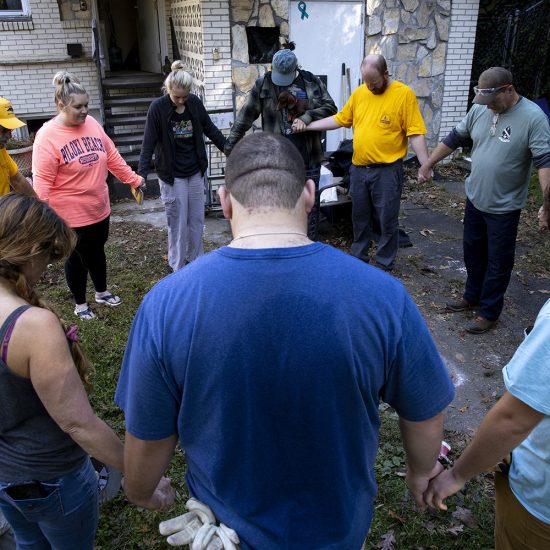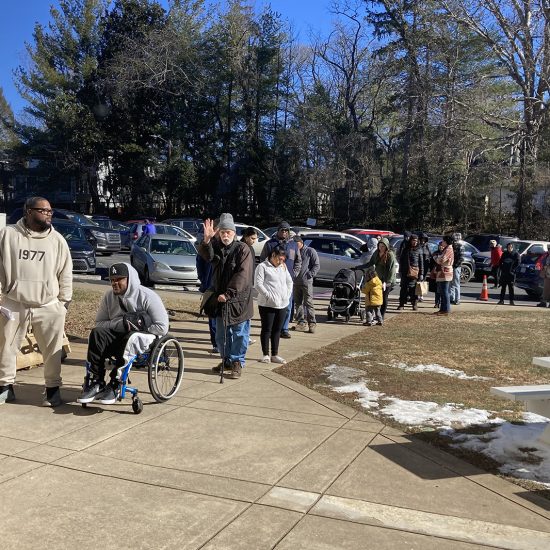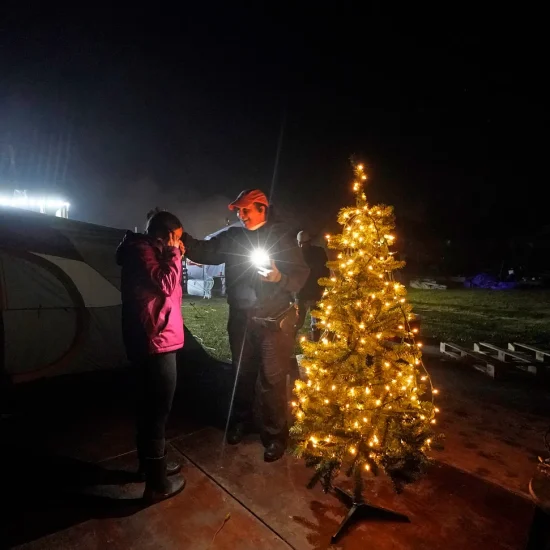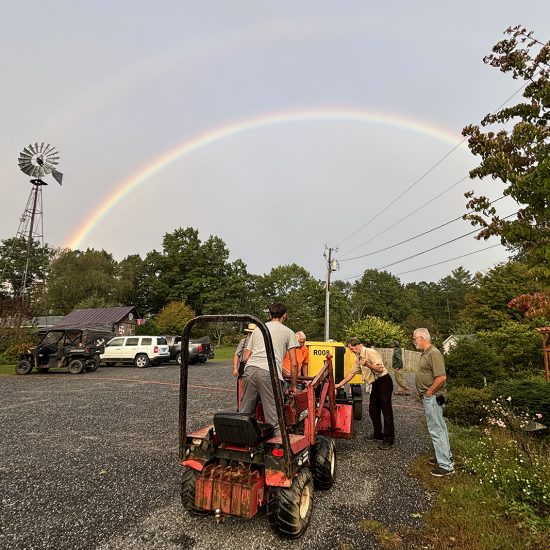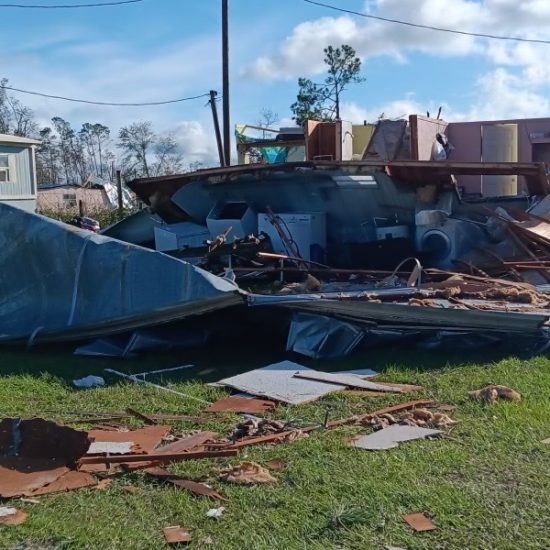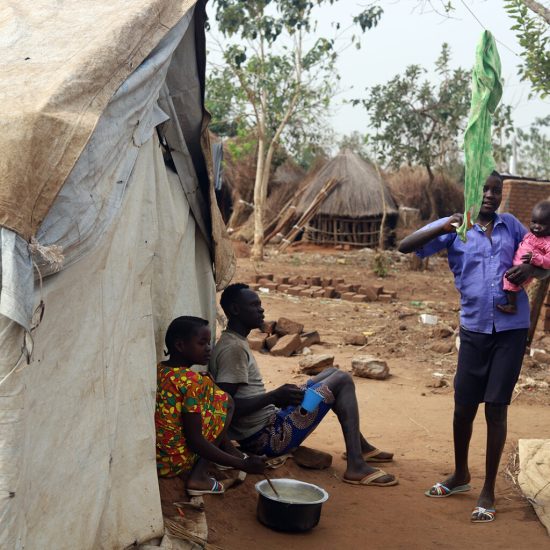PRINCEVILLE, N.C. (RNS) — When it comes to disaster relief, few outfits across the South have been as organized, efficient or cheerful as the Baptist and Methodist recovery networks.
Whether it’s tornadoes, floods or hurricanes, their know-how and can-do spirit have helped people gut uninhabitable homes and rebuild them from stud to kitchen cabinet.
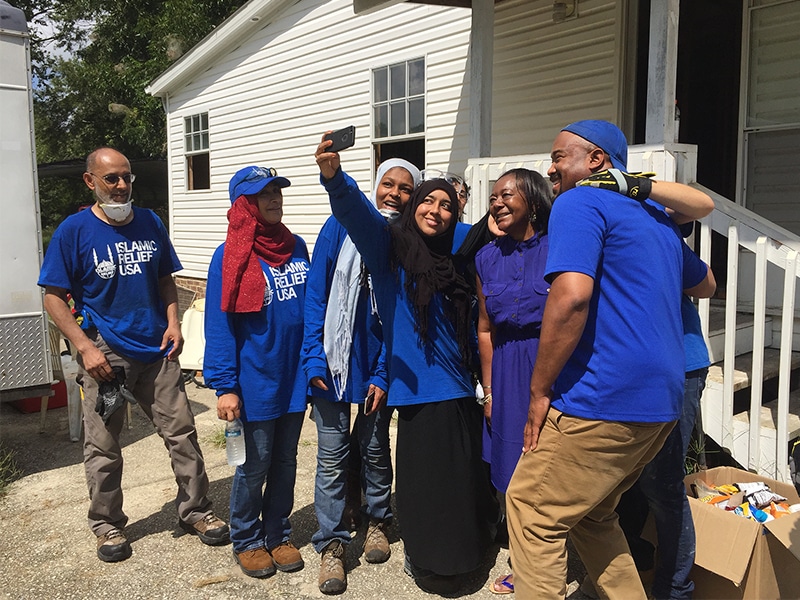 A group of volunteers with Islamic Relief USA take a selfie with Delores J. Porter,whose house was submerged in water after Hurricane Matthew flooded the town of Princeville. RNS photo by Yonat ShimronImagine Delores J. Porter’s surprise, then, when she gingerly stepped onto the exposed floor joists of her torn-out home to find a troop of young Muslim volunteers in blue “Islamic Relief USA” T-shirts installing support beams in the 90-degree heat.
A group of volunteers with Islamic Relief USA take a selfie with Delores J. Porter,whose house was submerged in water after Hurricane Matthew flooded the town of Princeville. RNS photo by Yonat ShimronImagine Delores J. Porter’s surprise, then, when she gingerly stepped onto the exposed floor joists of her torn-out home to find a troop of young Muslim volunteers in blue “Islamic Relief USA” T-shirts installing support beams in the 90-degree heat.
“I just don’t know how to thank you enough,” said Porter, 61, a lifelong resident of Princeville, wiping the sweat off her forehead. “If I start tearing, just forgive me. It has been a long journey.”
Porter had been delivering Meals on Wheels in the small Eastern North Carolina community when she saw people working at her house, abandoned since mid-October after floodwaters rose nearly 10 feet in the one-story house she shares with her husband.
She was so overjoyed to see the workers she had to stop to peek in.
“I will take a hug from everybody,” said the former schoolteacher and administrator. “I am a hugging person. And if you don’t mind my perspiration, I definitely don’t mind yours.”
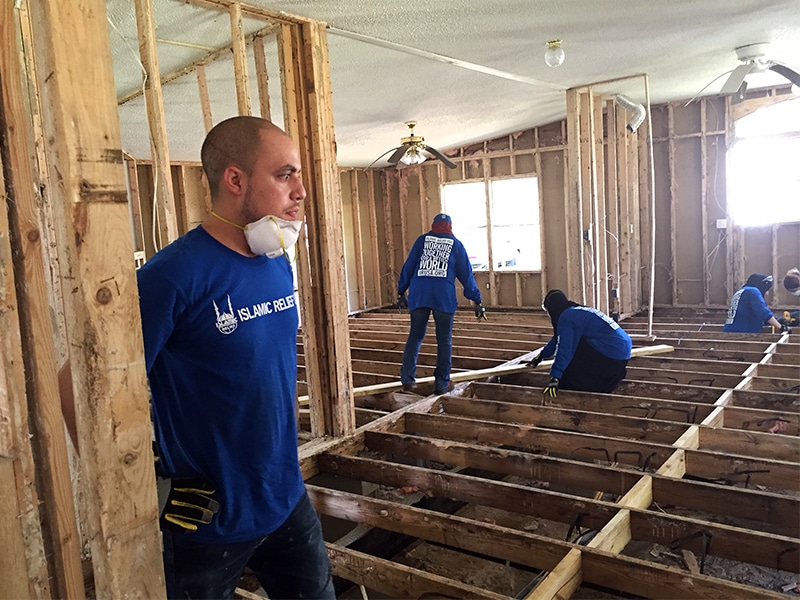 Abdullah Shawky, a disaster response team manager with Islamic Relief USA, surveys the work in Delores J. Porter’s home in Princeville, N.C. RNS photo by Yonat ShimronAt a time when the far right often cites the inability — or refusal — of Muslims to assimilate, these young volunteers are ready, willing and able to do what other religious groups in this country have been doing for decades: providing emergency aid, labor and comfort to people suffering the effects of natural disasters.
Abdullah Shawky, a disaster response team manager with Islamic Relief USA, surveys the work in Delores J. Porter’s home in Princeville, N.C. RNS photo by Yonat ShimronAt a time when the far right often cites the inability — or refusal — of Muslims to assimilate, these young volunteers are ready, willing and able to do what other religious groups in this country have been doing for decades: providing emergency aid, labor and comfort to people suffering the effects of natural disasters.
“It’s a great way to show other people that Muslims are friends and that we can work together,” said Mimi Hassanain of Livingston, N.J., an employee with Islamic Relief who sanded drywall in a Princeville home Tuesday (Aug. 22).
Hurricane Floyd, which plowed through here in 1999, destroying much of the town, was supposed to be a 500-year flood. But it was followed 17 years later by another 500-year flood when Hurricane Matthew bore down, submerging Princeville after the Tar River levee failed.
Ten months later, the work of rebuilding the nation’s oldest town incorporated by freed slaves continues. Many of its 2,080 residents — nearly all of whom are African-American — have taken shelter in FEMA trailers, hotels, rentals or relatives’ bedrooms. Many can’t afford flood insurance, which can be pricey in a flood plain, and are living off Social Security. They’re grateful for any assistance they can get.
The town’s only restaurant reopened recently, as have a few hair salons and a transmission shop. But many ranch-style homes are still empty.
In the neighboring community of Tarboro, the North Carolina Conference of the United Methodist Church has set up an operational base in an old health department building, turning office cubicles into sleeping quarters and a former laboratory into a communal kitchen.
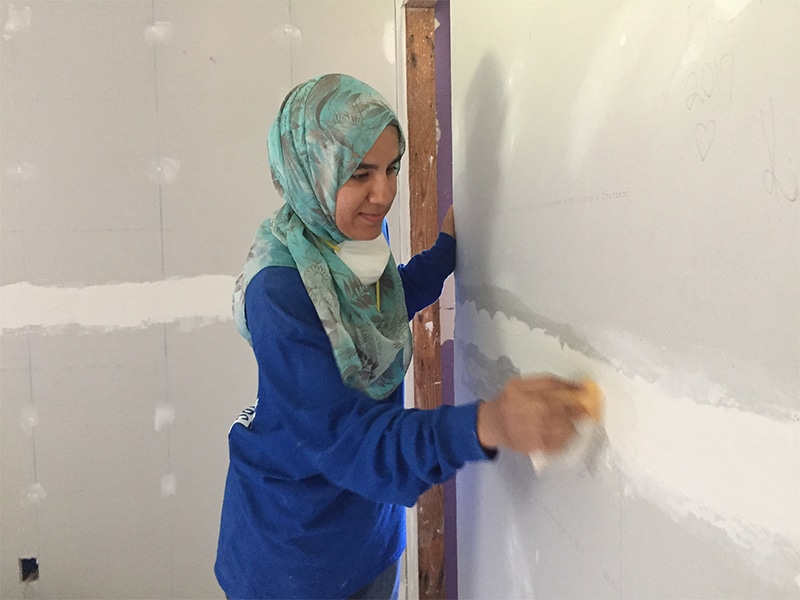 Amaney Kazlak of Jersey City, N.J.,, an Islamic Relief USA volunteer, uses a sanding sponge to smooth out the newly installed drywall in a home in Princeville, N.C. RNS photo by Yonat ShimronFrom here, an average of 50 volunteers — Methodists, Baptists, Presbyterians, Lutherans and Mennonites — spend one week at a time gutting homes or installing new drywall. Among the most recent recruits: 18 Muslim volunteers with Islamic Relief USA. The nonprofit relief and development group based in Alexandria, Va., was founded in 1993 and is now the largest Muslim charity in America, with a budget this year of $113.5 million.
Amaney Kazlak of Jersey City, N.J.,, an Islamic Relief USA volunteer, uses a sanding sponge to smooth out the newly installed drywall in a home in Princeville, N.C. RNS photo by Yonat ShimronFrom here, an average of 50 volunteers — Methodists, Baptists, Presbyterians, Lutherans and Mennonites — spend one week at a time gutting homes or installing new drywall. Among the most recent recruits: 18 Muslim volunteers with Islamic Relief USA. The nonprofit relief and development group based in Alexandria, Va., was founded in 1993 and is now the largest Muslim charity in America, with a budget this year of $113.5 million.
The organization first sent a team to Princeville shortly after the October hurricane. Now it’s extending its collaboration with the Methodists.
“This partnership is awesome,” said Jason DuVall, the Methodist site manager. “I’m super stoked.”
On a sweltering day, the volunteers, plus five Islamic Relief employees, split up into two groups; one to sand and tape drywall in the home of Marvin and Yvonne Dancy; the other to add support beams in the Porter home.
A day earlier, all 23 of them attended a daylong training session led by the United Methodist Committee on Relief that covered everything from how to handle moldy interiors to how to use a chainsaw and what supplies to bring to the job.
More Muslim volunteers will be traveling to Princeville for weeklong stints in September, October, November and December.
“We’re building up our capacity as a team,” said Hani Hamwi, Islamic Relief’s team manager. “We’re bringing in more skill sets.”
Princeville does not have a mosque and there are probably few Muslims living in the town. But its residents weren’t bothered by the volunteers’ faith.
In other places, that hasn’t always been the case. Last year, a Louisiana sheriff ordered the Islamic Relief workers to leave immediately after they arrived alongside the American Red Cross to assess property damage from a recent flooding, said Hamwi. When volunteers with the American Red Cross objected, the sheriff asked them to leave, too.
In Princeville, people seem to see aid workers, as opposed to Muslim aid workers.
“I don’t even know all the denominations that are here,” said Greg Bethea, Princeville’s interim town manager. “It’s like a love fest here. People are hugging the community.”
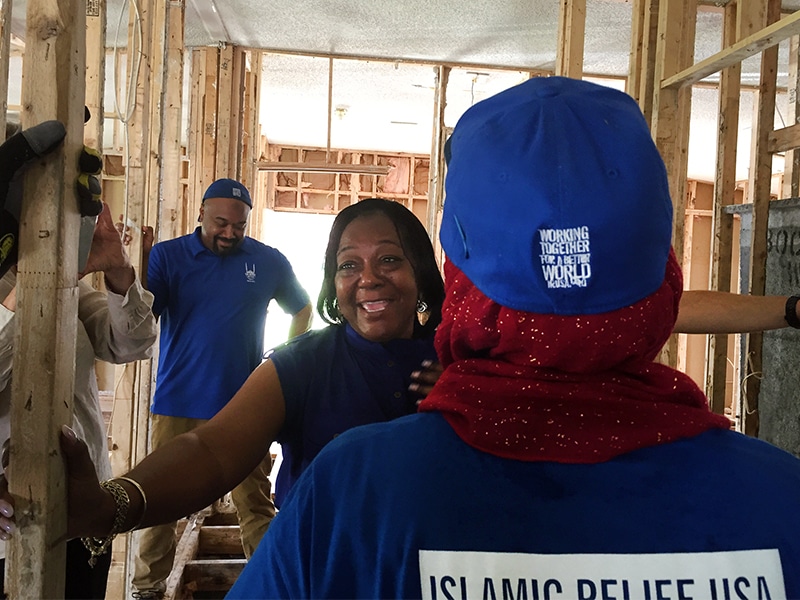 Delores J. Porter hugs each of the volunteers from Islamic Relief USA who worked in her home in Princeville, N.C. RNS photo by Yonat ShimronBethea said the only help the town doesn’t want is the help people don’t want to give.
Delores J. Porter hugs each of the volunteers from Islamic Relief USA who worked in her home in Princeville, N.C. RNS photo by Yonat ShimronBethea said the only help the town doesn’t want is the help people don’t want to give.
Over a bagged lunch of turkey, mayo and pepperoncini sandwiches, apples and chips, the volunteers shared how they wanted to make a difference.
There was Lamyaa Mowery, 24, who works for the Alliance for an Indivisible America 2020, a Sterling, Va., nonprofit organization that works to counter radicalization and xenophobic violence.
And there was Amaney Kazlak, 32, a civil engineer from Jersey City, N.J., who had never been to North Carolina but wanted the experience of volunteering before she switched jobs to work as a career counselor for young engineers.
The majority of the Muslim volunteers were women — many wearing a headscarf — and they made it a point to reassure homeowners who popped in to see the work that they were honored to work in their home.
They also insisted on a selfie.
Porter explained to the volunteers that she lost her parents’ home in 1999 and never imagined she would live to see another flood. She was visiting her daughter and granddaughter in Durham, 100 miles to the west, when the town flooded, but like many residents she decided to return to Princeville.
“I’m like Dorothy in ‘The Wizard of Oz,’” Porter told the volunteers. “I said, ‘There’s no place like home.’”
Porter, who is a member of Macedonia Missionary Baptist Church, which lies kitty-corner from her house, said she was surprised to see the Muslims there. They were not there in 1999, when it was mostly Christian volunteers helping the town rebuild.
“It just tells me you have people who have a generous heart and it doesn’t matter what religion they are,” she said. “It’s just a blessing.”

